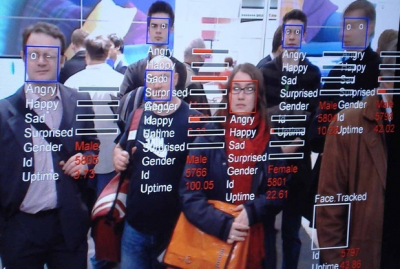Facial Biometrics Instead of Train Tickets? Don’t Even Go There

Have you seen the little film online by BBC Click showing an academic team at Bristol Robotics Laboratory who are looking to use facial recognition to improve train travel by the year 2020?
The intention behind the project we are told is by using facial biometrics instead of train tickets or Oyster cards it will put an end to the annoying queues which build up when people try and enter or exit the barriers.
What a jolly good idea! Or is it? Well frankly no it’s not, using facial recognition to enable people to travel is not quite as simple or as benign as the film implies.
Your facial biometric is completely unique to you. It is a critical part of your identity. As Lyndon Smith of the Bristol Robotics Laboratory says enthusiastically and frankly creepily at the end of the film
“the face is the key to getting everything you want to do in the modern world.”
Permitting private companies therefore to hold a biometric of your face purely so you can travel seems not just an excessive requirement but one fraught with privacy and security problem.
From a security point of view if the database holding all these unique facial biometrics were to be hacked, misused or lost in anyway, all the people stored on it would become instantly vulnerable to identity theft, as after all your facial biometric is the equivalent of your fingerprint or DNA and imagine the impact on you if either of those were stolen or misused.
And don’t be reassured by promises that such databases will be hashed and encrypted, we all know what the Government thinks about that, with the threat of weakening or scrapping encryption regularly mooted by the Home Office and Prime Minister there is no guarantee of security for us there either.
From a privacy point of view, let’s be clear, as soon as these companies have access to your facial biometric for train and tube travel you can guarantee their database would be shared and used by the British Transport Police for policing and safety purposes at train stations.
This would inevitably mean your facial biometric would be included in CCTV facial recognition systems used for policing across the country, enabling your face to be picked out of a crowd anytime and anywhere a facial recognition system was deployed.
This is not pie in the sky, Leicestershire Police used facial recognition on people at Download Festival in 2015, the Met Police used it at Notting Hill Carnival last year and South Wales Police deployed it at the Champions League Final in Cardiff in June.
That lovely little plan to reduce queues of people at train stations all of a sudden will become a surveillance capability monitoring everyone who has had to hand over their face simply in order to be permitted to travel.
But what of those who are visitors to the UK, those tourists who use the tube for a few days on their holiday to London, or those of us who are drivers but occasionally take a train, how are they going to pass through the gates? Will we all have to have our facial biometrics created simply in order to travel? Will this process be the start of another call for identity cards?
The work being done by the team at Bristol with the support of Cubic the company behind the Oyster cards, a company who are also involved in global defence and mission solutions, ought to sound alarm bells.
We are already the most watched nation on earth thanks to our CCTV, adding our faces to systems purely to travel is a privacy and security infringement none of us should be enthused by.

